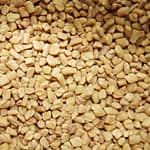Methika is a popular herb revered by many traditional medicine systems like Ayurveda and Unani. It is mostly used as a spice in many household. It is known by different names like Methika in Sanskrit, Methi in Hindi and Fenugreek in English. Methika has been given the scientific name – Trigonella foenum-graecum.
According to various folklore and myths, Fenugreek is considered as the lucky legume of the bean and pea family expected to bring money and prosperity at homes.
Methika: Anatomy And Distribution
Belonging to the Fabaceae or the Legume family, Methi or Fenugreek is an annually growing aromatic plant which can reach up to the height of 60 cm. The leaves are alternate and trifoliate. It is normally the leaves and the seeds which are used for consumption. Flowers of the plant are white in colour and the seeds are yellowish brown and hard. Fenugreek grows mostly in semi arid areas and India is the largest producer. But it can also be found growing in Pakistan, Afghanistan, Nepal, Bangladesh, Iran, Spain, France, Argentina, Morocco, Egypt and Turkey.

Methika: Uses and Properties
The herb fenugreek has a number of uses:
- It is mostly used in cooking as a spice. The fresh leaves of the plant are also used as vegetable.
- According to Ayurveda and a number of other traditional medicine systems consider Methika as a cure to many ailments.
- It is even used as a cattle feed.
The nutritional profile of fenugreek is as follows:
- Water
- Carbohydrates
- Protein
- Fat
- Calcium
- Manganese
- Magnesium
- Iron
- Sodium
- Potassium
- Vitamin A
- Vitamin B 6
- Vitamin C
The medicinal properties of Fenugreek are:
- Anti hyperglycemic
- Anti diabetic
- Anti spasmodic
- Anti rheumatic
- Anti oxidant
- Anti carcinogenic
- Anti microbial
- Anti inflammatory
- Analgesic
- Nervine tonic
- Neuroprotective
- Digestive stimulant
- Pancreas stimulant
- Carminative
- Galactagogue
- Emmenagogue
- Sialagogue
Ayurvedic Properties or Gunadharma of Methika
- Physical property (Guna) – light (laghu) and snigdha (oily)
- Taste (Rasa) – bitter (tikta), astringent (katu)
- Potency (Veerya) – ushna or hot
- Conversion after digestion (Vipaka) – pungent after digestion
- Pravbhava (Action) – digestive
- Effect – increases pitta, pacifies vata and balances kapha dosha
Methi Benefits
Anti inflammatory
Fenugreek has very strong anti inflammatory properties and can help in providing relief from internal as well as external inflammation in the body. It can prove to be helpful in problems like boils, ulcers, tuberculosis etc. Methika is able to help with internal inflammatory issues by slowing the absorption of sugar inside the stomach and stimulating insulin production. This process provides a cooling effect and reduces inflammation.
Ayurveda calls Methika as one of the best remedies for body aches. Body aches are generally caused due to lipid peroxidation in the muscles. Since Methika has anti oxidant properties, it helps in reducing the oxidative stress and provides relief from soreness and muscle aches. It is even helpful in providing strength during fatigue.
Also Read : How to Use Methika Seeds For Facial Skin Care?
Fenugreek And Joint Issues
Due to its anti inflammatory properties, Fenugreek is equally helpful in dealing with joint related problems. Its analgesic and anti inflammatory effect on the joints can help reduce pain, stiffness and swelling. Applying the seed paste on the affected area raises the blood circulation in that area and provides relief. It can also be applied on boils and bruises.
It also has anti arthritic and anti rheumatic activity and thus it helps in reducing lipid peroxidation in the cartilage and increasing glutathione and superoxide dismutase. These two substances help prevent tissue damage which is common in arthritis as the immune system misunderstands the tissue cells to be foreign bodies and attacks them.
Suggested Remedy: To reduce inflammation, pain and stiffness, the following mixture should be consumed twice a day with warm water – 3 gram Fenugreek seed powder, 1 gram dry ginger powder, 1 gram Ashwagandha powder, 1 gram Punarnava powder, 125 mg Black pepper and 3 gram jaggery.
Wonderful For Diabetes Patients
Fenugreek is one of the best herbs available for diabetes patients and is equally helpful in diabetes I as well as diabetes II. A soluble fiber called galactomannan is present in the fenugreek seeds. The special property of this fiber is that it slows down the absorption of carbohydrate in blood which helps in keeping the blood sugar level balanced.
Fenugreek increases the production of insulin in pancreas. It even helps in decreasing insulin resistance of the body suffered by type II diabetes patients. Diabetes is considered as a very serious disorder as it not only leads to imbalance in the blood sugar level but also affects the functioning of other organs of the body. In serious cases, it can even lead to multiple organ failure.
Can Help Cure Digestive Ailments
Methika can be called a boon for all those people suffering with stomach disorders. Containing a good amount of non-starch polysaccharides (NSP) and mucilaginous fiber, fenugreek helps in easing bowel movement. As Ayurveda says, it even helps in providing strength to the intestine walls and further enhances peristaltic movement. Thus it is considered as one of the best home remedies for people suffering with chronic constipation.
Fenugreek even helps in cleaning the intestines of the sticky and oily food substances. It does this by promoting bile secretion from the liver to the intestine.
Poor digestive capability and poor absorption of food in the body can lead to mucus in stool. It can also be caused due to an infection. Methika’s anti microbial, anti inflammatory and digestive properties help in keeping the gut healthy and promoting better digestion and absorption.
Suggested Remedy:
- If suffering with constipation, it is recommended to soak a teaspoon full of fenugreek seeds and consume them at night before going to sleep.
- In case of diarrhea or mucus in stool, it is recommended to consume a mixture of 3 gram fenugreek seed powder, 1 gram cumin powder and a pinch of rock salt with buttermilk. It can be consumed twice a day for quick relief.
For A Healthy Reproductive System
Methika is one of the aphrodisiac herbs and it can help increase sexual arousal and testosterone level in men. It even improves the energy and stamina. Since it can act as galactogogue, it can help increase milk supply in breastfeeding women. It even prevents infection in uterus and helps recover the size of uterus to original in new mothers.
Since fenugreek seeds contain phytoestrogens which acts like estrogen in the body, it is one effective remedy for natural breast enlargement. It can even help women keep breast cancer at bay. Apart from this, the diosgenin and isoflavones present in Fenugreek seeds help in dealing with pre menstrual syndrome and stomach cramps during menstruation.
Methika In Loss Of Appetite
Fenugreek has restorative properties and it helps in dealing with loss of appetite. Its bitter astringent flavor provides a new taste its ability to absorb nutrients better proves to be quite helpful. Fenugreek makes up for loss of appetite by improve the functioning of the digestive system and the liver by increasing the secretion of bile.
For A Healthy Liver
Liver is one of the most powerful organs of the body as it helps in the detoxification of the body. However, most of us do not pay much attention to the health of our liver. A poor functioning liver can lead to many fatal problems. Whenever we take in polluted air or consume heavy antibiotics, it is our kidney and our liver which bear the stress. Resplendent with polyphenols, fenugreek seeds create a protective layer around the liver saving it from toxicity. It is helpful in liver disorders like the fatty liver disease and liver cirrhosis. Fenugreek even has the ability to protect the liver cells from damage due to alcoholism.
Mouth Related Problems
Fenugreek is a sialagogue, which means that it helps in inducing the secretion of saliva and increases its production. This way it helps in dealing with unwanted dryness of mouth or xerostomia. Along with this, its anti microbial action ensures that the mouth remains free from infection and foul breath.
It even helps in dealing with the unwanted sweet taste in the mouth which is the result of excess Kapha formation. Since Methika helps in balancing the Kapha dosha, it proves to be helpful in dealing with this problem.
Urinary Disorders
An extract obtained from the leaves of the Methika plant is used along with Catechu and Misri to treat the problem of Polyuria or frequent urination. Fenugreek is also helpful in controlling enuresis or bedwetting disorder.
Suggested Remedy: A remedy for children greater than five years of age and still going through bedwetting is to give them a mixture of Catechu and Fenugreek seed powder, mixed in equal amounts twice a day for about two to four weeks.
In Throat Issues
Fenugreek proves to be quite effective in dealing with throat related problems like tonsillitis and pharyngitis. Being an anti bacterial, it helps prevent any infection in the throat and the mucilage in it creates a protective coating in the throat, protecting it from pain and cough. For people who suffer with coughing while sleeping can prevent it by consuming methika extract before going to bed.
Suggested Remedy: If suffering from Tonsillitis, it is recommended to take 20 g fenugreek seeds and 800 ml water and prepare a decoction until it remains 200 ml. This is then used for gargling and helps in providing relief from the inflamed tonsils.
A Powerful Anti Oxidant
Packed with high levels of polyphenolic flavonoids, Methika provides a powerful anti oxidant activity. It helps protect the erythrocytes from any damage that might be caused by free radicals. It helps the body from any kind of oxidative stress which might be caused due to free radicals. Fenugreek protects the normal cells from the cells which might be damaged due to free radicals and thus helps in preventing the formation of cancerous tumors.
Recommeded Dosage
According to the Ayurvedic Pharmacopia of India, the general recommended dosage of Methika is 3 to 6 grams of seed powder per day.
According to Nighantu Adarsha, the recommended dosage is:
- As churna or seed powder – 6 to 12 grams
- As swaras or extract – 12 ml
Methika: Side Effects And Precautions
Consumption of fenugreek beyond recommended dosage can cause certain side effects and thus requires a few precautions.
- Being a mild laxative it can cause loose stools.
- When consumed in large quantities, fenugreek can cause – nervousness, headache, fast heartbeat and stomach upset.
- People allergic to fenugreek can also develop a reaction like rashes.
- Although fenugreek is not considered to be unsafe for pregnant and lactating mothers but sometimes in large quantities it might lead to miscarriage; thus it is recommended to obtain a doctor’s prescription before consuming it.
- People with bleeding disorders must avoid consuming the herb.
Did you find this post useful? Would you like to get back to it later? Save THIS PIN below to your Pinterest Natural Living or Ayurveda board!

